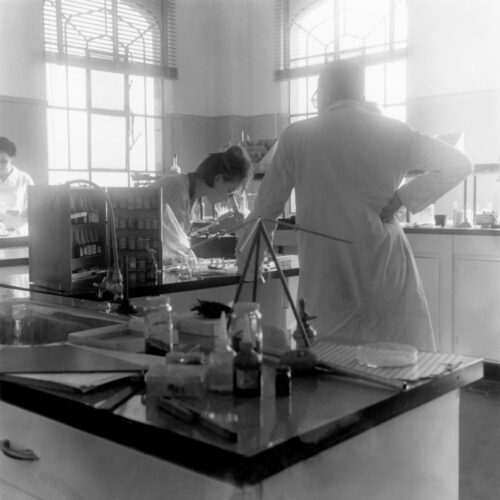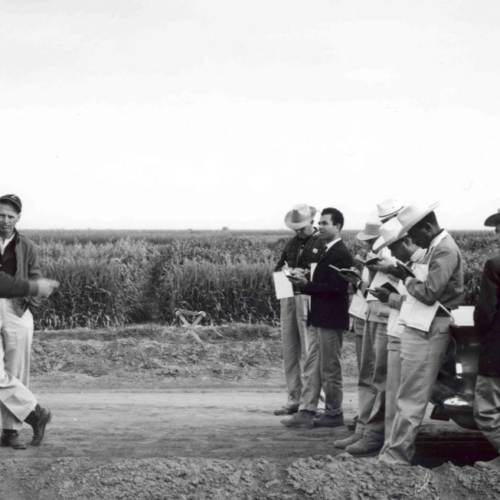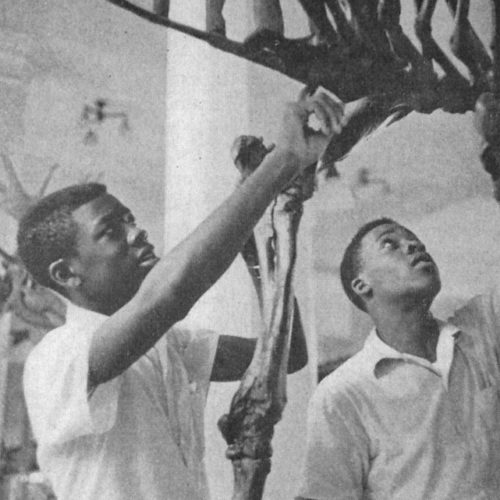In this installment of our New Research series, we feature four recently-published reports. They draw on archival records from several Rockefeller Archive Center collections.
“Neither Right nor Left: Grassroots Black Conservatism in Post-World War II America” by Chanelle Rose
Chanelle Rose’s research report, “Neither Right nor Left: Grassroots Black Conservatism in Post-World War II America” looks at the values and concerns of Black conservatives during the postwar era. While in recent decades, historians have begun studying the rise of the “New Right,” Dr. Rose argues that they have not looked closely at the growth of the African American conservative movement, particularly on the local level.
Dr. Rose, an associate professor at Rowan University, seeks to fill that gap. She focuses her attention on Black grassroots organizations and how issues motivating conservatives within the African American community were shaped by their own racialized experiences. Concerns about crime, education opportunities, and economic development were central themes to their agenda.
Her report uses materials from the Nelson A. Rockefeller gubernatorial records, from his personal papers, as well as from the Ford Foundation archives.
“Lost in Translation? US Foundations as Mediators between US Interests and the International Climate Policy Space” by Edouard Morena
In “Lost in Translation? US Foundations as Mediators between US Interests and the International Climate Policy Space,” Edouard Morena discusses how American foundations were actively involved in encouraging the United States to formulate an active international climate change policy. US foundations were well-positioned for this role since they had deep ties with the US foreign policy establishment and also had broad experience in projecting “soft power” for American values.
Dr. Morena sees the the road to the 2015 Paris Climate Agreement as characterized by a three-stage process. His research report centers on the first period, starting in the early 1980s, when foundations were participating in efforts to establish the international climate regime and were also working to draw the United States into this agenda.
Edouard Morena is a lecturer at the University of London Institute in Paris. During his research visit to RAC, he read through documents from the Rockefeller Foundation and the Rockefeller Brothers Fund archives. In addition to forming the basis for this report, these records have also proved valuable for an article that he published this year in the academic journal, International Politics.
“University Development of American Foundations in British Africa” by Dongkyung Shin
Dongkyung Shin’s research report, “University Development of American Foundations in British Africa,” explores the role of the Rockefeller Foundation and the Ford Foundation in fostering academic institutions in newly emerging Africa. She argues that British officials, aware of the experience foundations had in areas of international development. encouraged them to direct their grant-giving to African universities.
The University of Ibadan in Nigeria became an early beneficiary of this American philanthropic largesse. However, despite the high level of cooperation with the American philanthropies, British authorities discovered that the support by American foundations for African institutions was not aimed at fostering British post-colonial influence in Africa. Instead, the foundations had their own goals, which included conscious “de-Anglicizing” of the universities.
A doctoral candidate at King’s College London, Dongkyung Shin’s archival research at RAC will be incorporated into her dissertation.
“Intellectual Relief in Europe following the First World War” by Tomás Irish
In his research report on philanthropic activities in Europe after World War I, Tomás Irish made extensive use of the archives of the Rockefeller Foundation, the Laura Spelman Rockefeller Memorial, and the Commonwealth Fund. Materials he viewed in these collections document the efforts of foundations to alleviate intellectuals suffering from the consequences of the Great War, as well as from the Bolshevik Revolution.
This targeted support was in addition to their broader humanitarian relief campaigns, since foundations had deep concerns about preserving Europe’s cultural and intellectual heritage as it emerged from conflict. “Intellectual Relief in Europe following the First World War” also analyzes John D. Rockefeller’s personal philanthropy to help displaced scholars as well as his readiness to provide funds to rebuild devastated cultural institutions such as the destroyed library of the University of Louvain, Belgium.
Dr. Irish is a senior lecturer in modern history at Swansea University, UK.
About the RAC Research Stipend Program
The Rockefeller Archive Center offers a competitive research stipend program that provides individuals up to $5,000 for reimbursement of travel and accommodation expenses. Learn more on our Research Stipend page.



